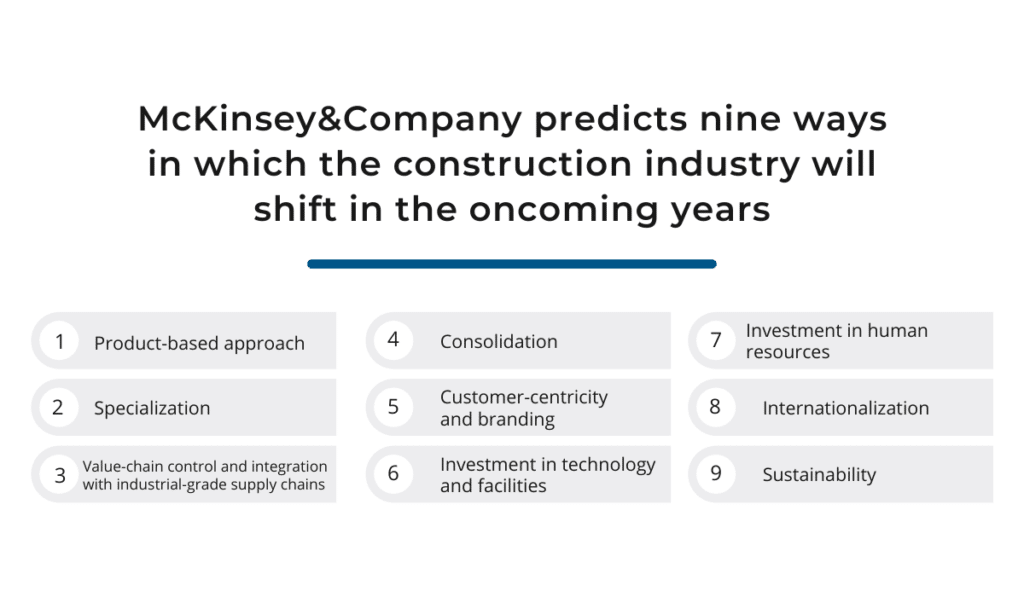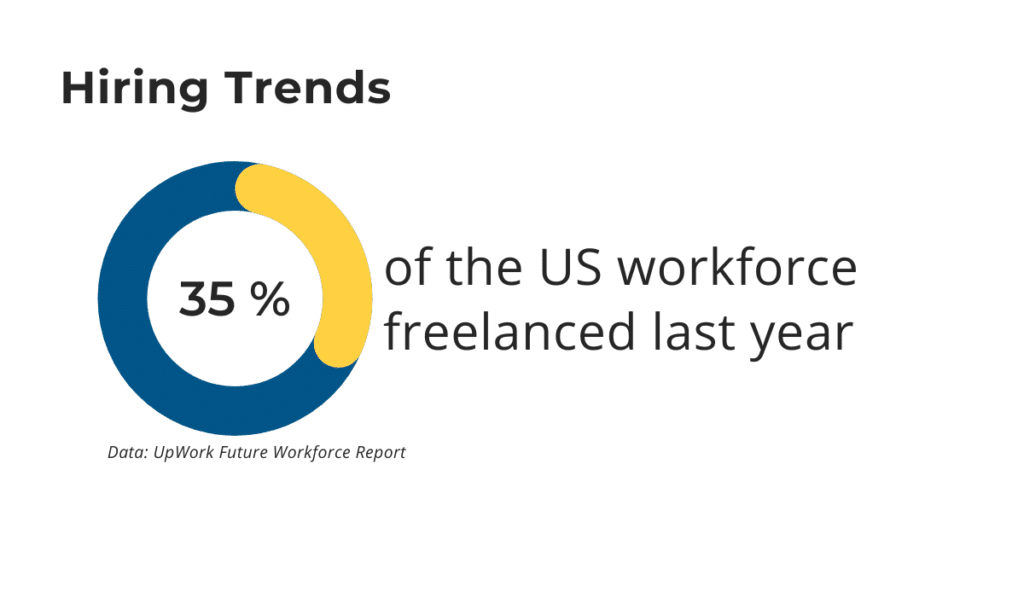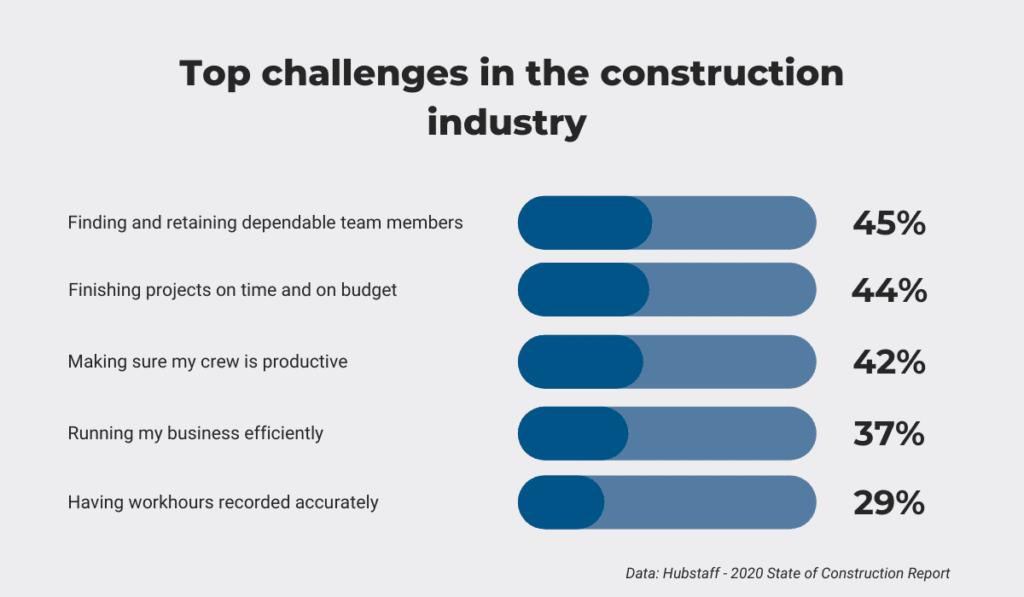There’s a problem that’s been plaguing the construction industry for decades.
Nearly half of construction companies will close their business in the first five years. The top reasons for this are unsustainable business decisions and the unwillingness to adapt to changes.
As a contractor, you’re overwhelmed with many challenges that can stifle your growth. From customer complaints to poor project outcomes, there’s plenty to be worried about.
But to succeed in this competitive industry, you need to make smart decisions and create strong foundations to grow your business more sustainably.
So here are five key things you need to implement in your business strategy for long-term success.
In this article...
Specialize Your Contractor Business
You might think it’s better to present yourself as a company that can do a bit of everything and that such an approach is more profitable. But you’d be wrong. The secret to getting more high-paid jobs is to specialize.
In fact, McKinsey&Company predicted nine ways in which the construction industry will shift in the oncoming years, and specialization is one of them.

What does specialization mean?
When customers see you’re offering twenty different services, they’re left with the impression that you’re not an expert in any of them. To them, you’re just like any other general contractor.
As a result, they won’t even look at your specific offer but, instead, compare you to others and find a contractor who can do the same job but for a lower price.
So, the obvious solution is to focus on something you’re an expert at and stand out from the competition. That way, you get hired for your knowledge and reputation for solving specific problems. This means you can also charge more for your work.
Focusing on very particular issues will result in better project outcomes, as well, because you’ll develop experience and effective problem-solving mechanisms.
For example, when you only do kitchen remodels, you can estimate how much material and labor it will cost you with a lot more accuracy.
Also, you can offer your customers a wider range of materials and solutions, which will provide them more satisfaction. In turn, they’ll happily share their positive experience with others and get you more clients.
So, the question you should be focusing on is how to specialize. Luckily, there are various ways in which you can take your company to the next level in a particular field.
Take a look at this table that lists some options you can choose from when picking a niche:
| Contract | Large or small Per plans or design-build Service or maintenance |
| Specialty | Schools or hospitals Offices or manufacturing New homes or remodels Factories or warehouses |
| Project | Public or private Commercial or residential New construction or remodel Site work or buildings Single or multi-building |
| Location | City or region Neighborhood |
| Difficulty | Technical or simple Multi phased High-tech or standard |
| Customer | Company or individual Sophisticated or first-timer Multiple or single sites Homeowner or builder |
Remember, being renowned for your expertise is more valuable than being the cheapest option. Customers are more comfortable working with expert companies they know will solve their specific problems.
Additionally, they’re more likely to be willing to pay more.
In the end, trying to be a jack of all trades will only put a strain on your finances and your team.
When you only have to take care of specific tasks and projects, you can better manage your budget and fulfill contracts.
Know When to Outsource the Work
Doing everything on your own might be a good idea when your company is small. But once your business expands, it’s time to let others do some of the work.
Simply put, you can’t simultaneously supervise your field workers, do the accounting and market your business all by yourself. There are limited hours in a day, and your business will be more profitable and efficient if you outsource some of those essential tasks.
Some areas you might consider outsourcing are bookkeeping, IT, customer service, and human resources. Qualified people will do this work faster, and it’ll save you time and money.
How to do this?
For starters, look up freelancers who will have the expertise for what you need. This might not be so difficult since recent research shows that almost 57 million Americans freelanced last year.
You can reach specialists from almost anywhere, and the primary benefit of freelancers means you’ll get high-quality work at a reduced cost.

Finally, if you find yourself overwhelmed with too many tasks to complete and you simply don’t have the time to handle them all, outsourcing is your best solution.
Join an Industry Association
Networking is crucial for any business, but even more so in construction.
First, being surrounded by industry professionals can help you get inside information.
You’ll be able to learn about changes and trends ahead of time so you can keep up with your competition. Also, connecting with your colleagues might lead to new contracts or valuable referrals.
On the other hand, as a growing business, you might see more benefits in the education programs industry associations offer. Then you can develop new business skills and find more business opportunities.
Even though most associations charge membership fees, it’s a good idea to regard them as an investment in your business.
So, here are some other ways industry associations help contractor businesses:
- Government lobbying
- Group purchasing
- Government regulations
- Industry standards and certifications
At the end of the day, industry associations are created to help members with every aspect of their contractor business. So, joining an association means you’ll have someone in your corner to protect you and see you succeed.
Additionally, the most significant benefit you can get from joining an industry association is putting your name out there. You’re gaining name recognition among your peers.
If you’re now convinced of why you should join an industry association, take a look at this list of construction associations and become a member.
| Associated Builders & Contractors, Inc. | A national association representing 23,000 construction and construction-related firms. Represents all specialties within the US construction industry. |
| Associated General Contractors of America | The leading association in the construction industry. |
| American Institute of Constructors | Society of construction professionals who promote professionalism and excellence among their colleagues by certifying individuals as qualified constructors. |
| American Subcontractors Association, Inc. | Advocates for the rights and interests of subcontractors, while promoting quality construction, safe work environment, and ethical business practices. |
| American Society of Heating, Refrigerating and Air-Conditioning Engineers | An international organization promoting sustainability through research, continuing education, and publishing. |
| Construction Management Association of America | An organization dedicated exclusively to the interests of professional Construction Management |
| Mechanical Contractors Association of America | An association of mechanical, plumbing, and service contractors. Offers members education programs and resources to help them manage and grow their businesses. |
| National Association of Women in Construction | An international association dedicated to amplifying the success of women in the construction industry. |
Remember that industry connections can lead to more projects and provide opportunities for necessary business development. This will help you grow and become a leader in your field.
Be Prepared and Organized
Lacking timely information on site is the most significant factor that impacts a contractor’s productivity. And it’s all due to disorganization and inefficient processes which cause delays.
Furthermore, did you know that almost 45% of contractors spend most of their time on non-productive activities?
These include looking for project information, dealing with mistakes, and conflict resolution. In the end, such tasks cost your company money and impact its overall productivity.
After all, outsourcing might solve some of your problems, but successful business growth comes from the company’s organizational foundations.
What makes an excellent organizational foundation?
There are two key things: systems and digitalization. Both have the same outcomes for your company which include consistency, increased control, and eliminating problems. In turn, you can expect the increased quality of your work and profitability.
How can systems help?
First and foremost, they ensure that you produce the same excellent results on every project. With proper systems in place, everyone on your team knows how to do their job and report problems if the unexpected happens.
Little things will be handled without your constant supervision, and you’ll be able to focus on more important tasks.
How can digitalization help?
Digitalization, i.e., investing in construction management software, will support the systems you have in place. You’ll be able to keep up with your documents, timesheets, and job scheduling, managing them from a single source, so there’s less paper trail and missing documents.
Additionally, with a software solution in place, your project management team can easily access files about different projects you’re currently working on. This helps them see the projects’ progress without having to consult multiple people.
But apart from investing in software for construction management, it’s important to have tool tracking software too. This helps site managers and workers to perform their duties faster.

For example, with a few clicks on an app, an employee can see where a particular tool is kept. Then, they can find it without aimlessly searching the construction site.
Finally, if you have a good inventory storage system, the employee will know where to leave the tool once they’re finished.
In the end, good business organization means spending more time on essential tasks and minimizing problems. This starts with implementing the right systems and investing in digitalization that will support your business operations and growth.
Hire Smart and Capable People
According to the latest research, finding good workers is the biggest problem in the construction industry.

Actually, finding good workers is a problem in numerous industries, but construction has specific issues with hiring.
To start, the average age of a construction worker in the US is 42.5, which means a lack of young workers. A vast number of construction workers are approaching retirement age, and there’s nobody to replace them.
In fact, experts are reporting that almost 41% of the current US construction workforce will retire by 2031. So, the future of construction relies on recruiting the younger generations.
How to attract new and capable workers to your company?
First, you have to understand that you’ll never find someone who will be the perfect match for the job you’re hiring for.
For instance, they might have the education and the skills but lack the experience. But that shouldn’t discourage you from giving the right candidate a chance.
You can always fill any knowledge or experience gaps with the proper training as long as they have a good work ethic and the will to learn.
This leads to another critical issue you should consider when hiring. Your reputation significantly impacts the number of quality workers you will attract.
Employees will be loyal to someone who rewards them for their hard work, be it in increased wages, health insurance, retirement plans, or paid time off.
Offering such benefits can make you stand out from your competition and ensure you’re creating a culture where your employees can thrive professionally.
Here are a couple of tricks industry experts like Brad Humphrey (the founder of Pinnacle Development Group, a consulting firm for contractor operational strategies) swear by for hiring strategies.
The first is to look out for prospective employees during the off-season. Most workers are out of work during that period, so you’ll have better chances to find suitable candidates.
Humphrey adds that you’ll have to bring them in a bit early to train them, but the money you invest in them is well-spent if they’re a quality worker.
Another thing you can do is to reach out to local high schools or trade schools and offer internships. You can even start your own apprenticeship program.
In this way, you’re training a young employee to suit your company’s needs from the beginning, and you’re allowing them to grow with your company.
To conclude, the lack of construction professionals is a serious industry problem, but there’s something you can do to save your company from a worst-case scenario— become an employer that quality workers will gravitate towards!
Conclusion
Growing your construction business requires a lot of work.
There are so many things to consider, and you can never be sure if they will pay off in the long run. So, to set yourself up for success, it’s best to start planning carefully.
Consider different networking opportunities that being part of an industry association can give you. You can spread the word about your expertise and attract the best customers.
Additionally, using management software will ensure you’re a well-organized company, the kind experienced and qualified workers will want to work for.
By following these five key things, you can easily grow your company and find success.





